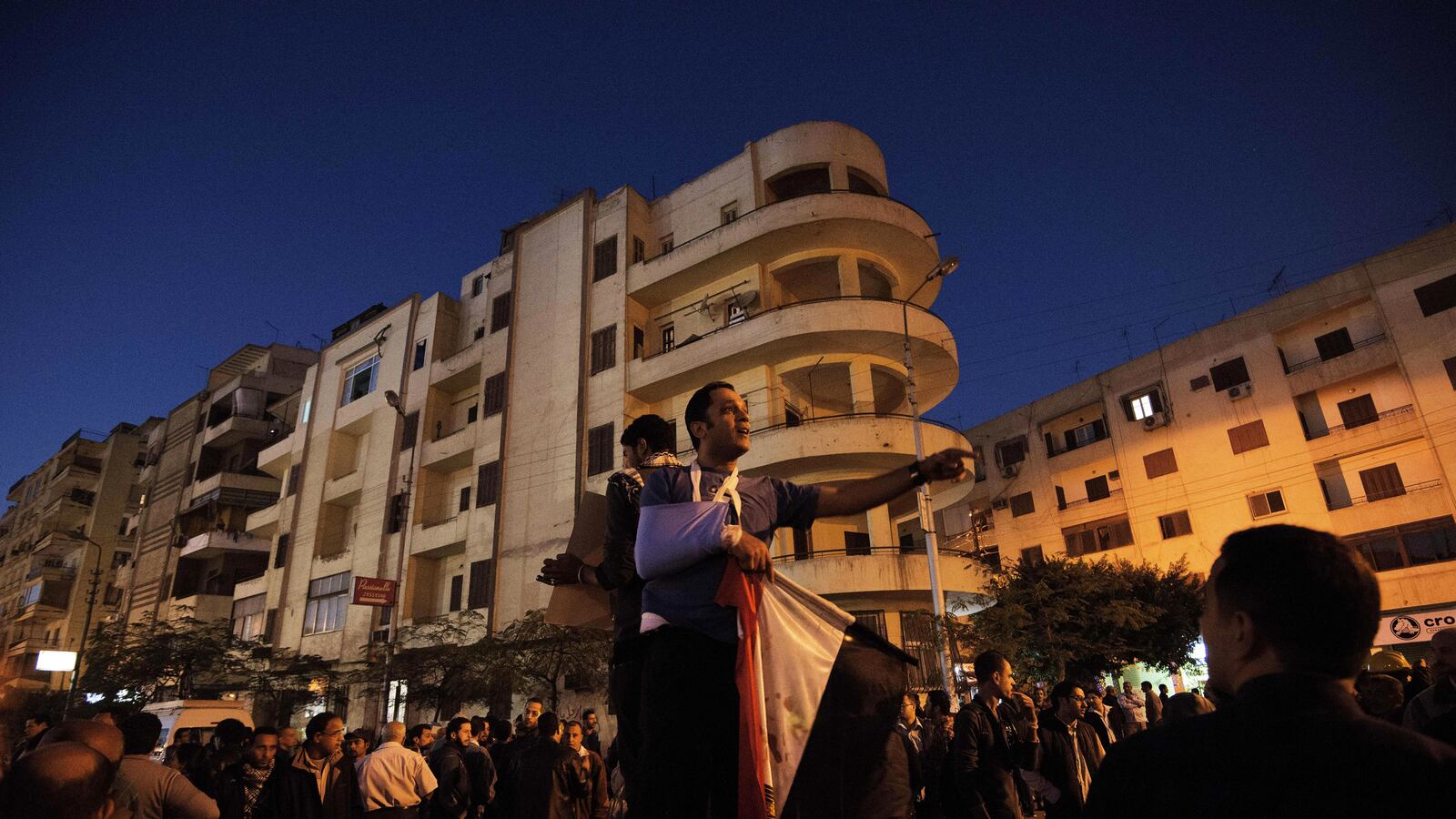Mohamed Rashed didn’t want to vote for Mohamed Morsi, but felt he had no choice. A 35-year-old engineer from Cairo, Rashed was part of the activist movement that helped spark Egypt’s revolution last year. When the country headed to its first free presidential election this spring, Rashed was torn. Like most liberals, he was wary of Morsi, a Muslim Brotherhood heavyweight running on the Islamist group’s ticket and promising to push a conservative agenda. But Morsi’s opponent had been prime minister under ousted dictator Hosni Mubarak, and was widely seen as a vestige of the corrupt old guard.
“One of two things could happen” in the event of a Morsi win, Rashed said he thought. “He could have good intentions and support the revolution. Or if not, then it would be the end of the Muslim Brotherhood once and for all.”
Thanks to the grudging support of voters like Rashed, Morsi won the presidency with 51.7 percent of the vote.
On Thursday night, after a day of clashing with Muslim Brotherhood supporters outside the presidential palace, Rashed said his worst fears for Morsi had come to pass. At least six people had been killed, and hundreds more injured, after Morsi supporters attacked a group of protesters camped outside the palace on Wednesday and, in the hours that followed, the two sides battled each other with firebombs, pellet guns, and bricks. The army then rolled tanks onto the streets outside the palace to restore calm. “The ugly part is happening,” Rashed says. “And it’s happening very quickly.”
When Morsi first assumed office, he appeared to be the relatively bland face of the Brotherhood’s Freedom and Justice Party (FJP), which had selected the University of Southern California graduate only after its first choice was disqualified. But last month, in an unprecedented power grab, Morsi issued a decree declaring himself free from judicial oversight—saying the move was designed to prevent the country’s judges from blocking a referendum on a new Constitution, which has caused controversy for its hardline stances on issues such as women’s rights and sharia law. The assembly charged with drafting the Constitution then pushed a final version through in a marathon session that included none of its Christian or secular members and only four women, all of whom were Islamists.
In response to Morsi’s decree, crowds flooded the streets with a vehemence not seen since the revolution, thronging Tahrir Square and chanting the old anti-Mubarak slogan, “the people want the fall of the regime.” Since then, clashes between Morsi’s supporters and the protesters have become increasingly bloody, culminating in Wednesday’s chaos.
On Thursday night, Morsi made a televised appeal to the Egyptian people, promising a “comprehensive and productive dialogue” with the opposition—but refusing to scale back his new powers and insisting that a referendum on the new Constitution will go ahead on December 15. After his appearance, the opposition seemed even more enraged, calling for another large-scale demonstration on Friday. “He put on his poker face,” said Yehia el-Gammal, a Cairo activist, shortly after the speech concluded. “This is escalation.”

Thousands of protesters massed again outside Morsi’s palace Thursday night, defying a curfew. Elsewhere in the city, more violent displays of anger took hold. Several Muslim Brotherhood officers reportedly were attacked, and Morsi opponents attempted to set the group’s main headquarters on fire, bringing riot police to the streets en masse. Outside the headquarters, in the Cairo neighborhood of al-Moqattam, Ahmed Naim used a whistle to try and organize demonstrators in front of a police line. “We voted for Morsi, and now we hate it,” he said. “He has to go.”
With the date for the referendum quickly approaching, many analysts say the Brotherhood’s formidable political machine should be able to turn out enough supporters to pass the draft into law. And ever since the Brotherhood swept parliamentary elections, winning 47 percent of the seats in Parliament—with the ultraconservative Salafist Al-Nour party grabbing another 25 percent—the country’s liberals have been fatalistic about the Brotherhood’s significant advantage on the ground.
“The Muslim Brotherhood are banking that, any referendum, they’re going to get the majority, and rightly so. They have a lot of support,” said Mahmoud Salem, a Cairo banker who, in his words, “likes to throw rocks” with the opposition. “The activists, they’re always in the middle of everything, so their only understanding of the world is right where they are. They never step out.”
But many now say they believe Morsi has overplayed his hand by trying to force through the Constitution and eliminate checks on his power—and that his response to the recent protests has only made things worse. Even many apolitical Egyptians, they say, have started to take note. “Morsi doesn’t hear the people. He only hears his party,” a Cairo driver named Hassan said Thursday. “And he is hearing bullshit.”
Amid the violence of the past two days, even some members of Morsi’s own government began to distance themselves. On Thursday, the director of state broadcasting resigned in protest of the escalating violence, as did the vice president of the FJP. The new general secretary of the committee tasked with overseeing the referendum also announced his intention to quit, bringing the number of resignations during the crisis over Morsi’s decree to nine.
“He is losing legitimacy,” said Gammal, the Cairo activist. “And you can’t govern these days without legitimacy. It’s no longer possible.”





